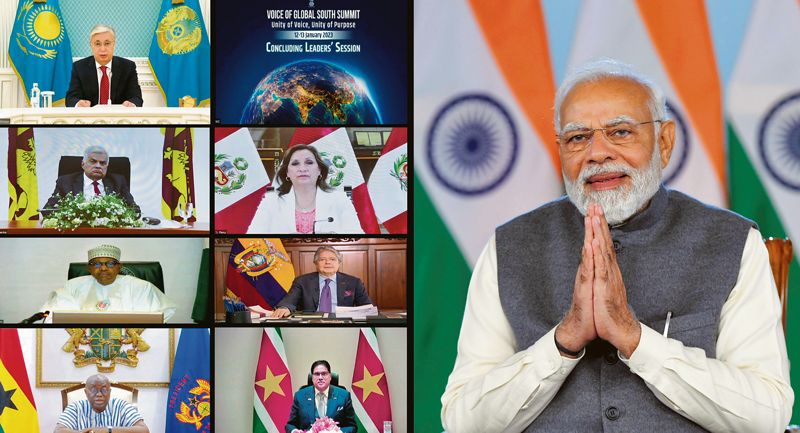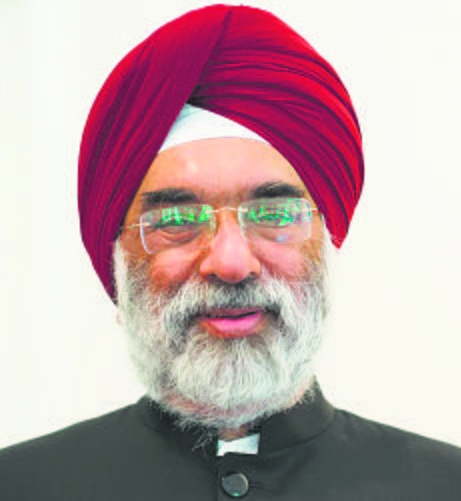Lending voice to Global South
- February 1, 2023
- Posted by: admin
- Category: India



By: Gurjit Singh
Former Ambassador
A MONTH into India’s G20 presidency shows that the country is taking its responsibilities seriously. India intends to be the spokesman for the Global South during its one-year tenure. A virtual Voice of Global South Summit, with the theme Unity of Voice, Unity of Purpose, was held on January 12-13. It gathered 125 countries from the Global South to exchange perspectives and set priorities. Thus, India’s G20 presidency is responsive in consulting ‘not just our G20 partners, but also our fellow-travellers in the Global South, whose voice often goes unheard.’
Also Read
Efforts to include countries outside the G20 purview show India’s keenness to democratise the international order.
The idea was to go beyond those already involved in the G20 and seek the views of the vast number of countries who are not within its direct ambit. Thus, G20 members Argentina, Turkey, Indonesia, Brazil, South Africa, Mexico, Saudi Arabia and China were not included in these consultations. Five of India’s neighbours participated; 48 African countries and seven from ASEAN were there, besides all five from Central Asia, 10 from the South Pacific and 29 from Latin America and the Caribbean. It was a welcome opportunity for several small countries to participate in the consultations and offer their views.
India’s special invitee guest countries for the G20 are Bangladesh, Egypt, Mauritius, the Netherlands, Nigeria, Oman, Singapore, Spain and the UAE. The G20-invited international organisations include the African Union (AU) Chair, New Partnership for Africa’s Development (NEPAD) Chair, ASEAN Chair, International Solar Alliance (ISA) and Coalition for Disaster Resilient Infrastructure (CDRI).
The interactions proposed a ‘whole of government’ approach in the engagement with the Global South and the G20. There were two leaders’ sessions: Voice of Global South — for Human-Centric Development, followed by Unity of Voice-Unity of Purpose. The leaders spelt out development priorities to set an agenda through a common voice and purpose.
India has been asserting that it intends to make reformed multilateralism and institutions for the 21st century a priority during its presidency. At the inaugural session, PM Modi highlighted the main issues for the developing world. The opportunity for uplifting societies and economies of the Global South through a shared vision and agenda for change was emphasised. He offered to share India’s experiences through sustainable solutions.
India is showcasing its achievements in vaccine development, biometric identification, digital public goods, financial inclusion, satellite technology, digital governance, last-mile connectivity. The country has announced more initiatives for expressing the voice of the Global South, including Aarogya Maitri, Global South Centre of Excellence Science and Technology Initiative, Young Diplomats Forum and Global South Scholarships.
As the G20 President, India is focusing on current issues of concern amid the big power rivalry and unilateral sanctions that are reducing the space for the South to develop. The promised benefits of globalisation have withered under selective sanction regimes. A major task for the South is to abide by international norms and prevent unilateralism by big powers.
In the financial domain, debt stress has limited G20 options. The people-centric aspects are the Sustainable Development Goals which are to be achieved by 2030, but delays are likely. These require consistent financing, which is being diverted due to the pandemic and the economic crisis. The Global South has been the net loser and it needs adequate financing for addressing its core priorities.
Financing is also an issue when it comes to balancing growth with environment-friendly lifestyles. The outcome of COP27 was disappointing in this respect. India’s initiative to encourage the ISA and CDRI and also alter lifestyles is aimed at a realistic goal-setting without depending solely on the G7 and China to fund the future of the globe. The South is exploring new technologies for renewable energy, including a green hydrogen initiative. This is based on a robust solar energy partnership for which the ISA, through its hybrid financing model, is likely to play a major role.
The human resource sector is also vital for the South. In the backdrop of the Covid pandemic, the stress is on increasing cooperation to build resilient healthcare systems. This includes funding more public health facilities and developing independent capabilities for prophylactic and remedy resources to be shared.
The current global crises, from the pandemic to the Ukraine war, have impacted economies. There is a need to develop synergies in the Global South on trade, technology, tourism and resources. This is critical to deal with trade flows, FDI, technology trade and standards, investing in connectivity infrastructure, and to diversify global supply chains.
India’s efforts to include countries outside the G20 purview demonstrate its keenness to democratise the international order. This is imperative as the UN and the international institutions are regarded as ineffective despite having universal membership and have been ignoring the views of the vast majority on critical issues and reforms. India has obtained an articulation of the entire Global South’s perspective and will provide a template for widening the consultative processes of the G20.
The initiatives are all based on successful Indian models of development cooperation. These are expected to enhance skill and talent building among countries of the South, boost cooperative innovation and add value to people-to-people relationships.
